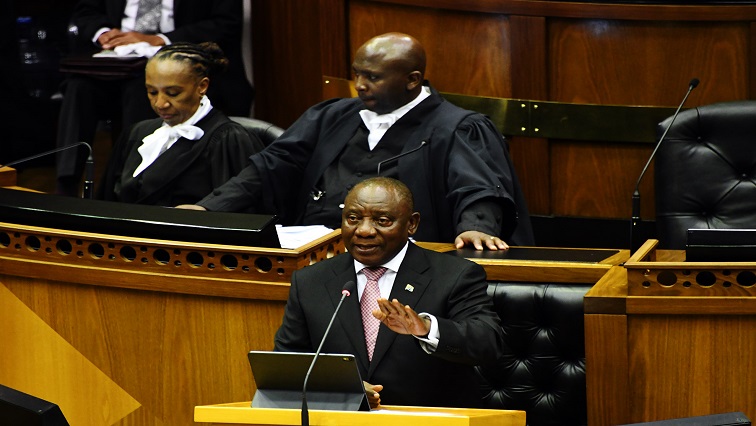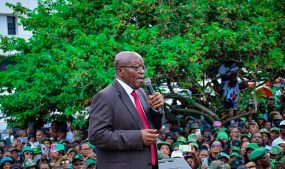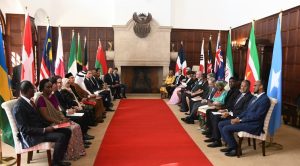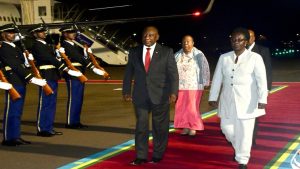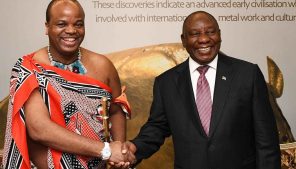National Assembly Speaker Nosiviwe Mapisa-Nqakula says she has no idea at this stage on whether President Cyril Ramaphosa will answer oral questions virtually or physically in Parliament on Tuesday next week.
She says she will get direction from the Presidency. Mapisa-Nqakula was responding to EFF MP Hlengiwe Mkhaliphi during the National Assembly Programme Committee meeting on Thursday. The committee met to among other things, outline its programme for the new quarter and to set the Assembly’s agenda for the coming weeks.
Mkhaliphi wanted to know whether Ramaphosa will be at the National Legislature in person on 30 August 2022 or not.
“I just want to get a clarity in terms of Tuesday. Is the President going to be physically in Parliament or will he be answering question virtual”, Mkhaliphi asked Mapisa-Nqakula.
In response the Mapisa-Nqakula told Mkhalipi, ” Well, honourable Mkhaliphi, I won’t know for now. I wouldn’t have that kind of information. What I do know is that the President has definitely confirmed that on the 30th (August) he will be taking questions. Whether he will do so virtually or physically, I expect that the Office of the President will inform me. For now I have no idea.”
Ramaphosa’s oral reply session will come at a time when the EFF has reiterated that he will never speak in Parliament. His last engagement with the Assembly was in June in the Good Hope Chamber where he delivered the Presidency Budget Vote and responded to the debate.
EFF MPs, who were removed from the Good Hope Chamber for preventing him from speaking, indicated that they would continue to prevent him from speaking in the House even in future. Some EFF members were forcibly removed by the Parliamentary Protection Services after they repeatedly interrupted the proceedings by rising on various points of order.
The President has been facing mounting pressure and criticism following the theft that occurred at his Phala Phala farm at Lephalale in Limpopo in 2020. It came soon after former Director-General of the State Security Agency Arthur Fraser laid criminal charges against the President for allegedly covering up the theft that took place at Phala Phala, where large amounts of US dollars were kept on his farm.
Mapisa-Nqakula reminds parties to submit names to serve on panel
In the meantime, Mapisa-Nqakula reminded MPs during the Programme Committee to meet the deadline of 1 September of submitting the names of persons to serve on the Independent Panel that would assess the motion brought by African Transformation Movement Leader Vuyo Zungula to remove the President from office.
Zungula invoked Section 89 of the Constitution and National Assembly Rule129C for Ramaphosa to be removed from office following the Phala Phala scandal. IFP Chief Whip Narend Singh sought clarity during the Committee meeting on how far the process was.
“Madam Speaker with regard to the Section 89, I know you requested us to submit our preferred panelists by the first of September. What time frame are you looking at after that and when do you think this panel can start actually doing the work with a clear term of reference?”, Singh asked.
Mapisa Nqakula gave an undertaking that the process would be sped up but also reminded parties not to miss the deadline of nominating candidates to serve on the three-member panel.
” Thank you very much honourable Singh. According to the (NA) Rules which I have seen the process after the appointment of the Independent Panel, will take about 30 days. Once the panel has been announced and appointed, that panel will have 30 days within which to do it’s work and present a recommendation to the office of the Speaker. So, I would imagine that in fact that’s one of the things I would want to remind honourable members about, which is that members have up to the 1st (September) to make the submissions. On the second we can be announcing the panel. And the panel will immediately start its work and it has exactly 30 days from that time, form the date of announcing. Mr (Masibulele) Xaso am I correct?”, Mapisa Nqakula answered Singh.
Secretary to the National Assembly Masibulele Xaso confirmed what Mapisa Nqakula explained. Xaso went further to caution that the availability of the selected three-member panel will also have to be established first.
” Madam Speaker certainly you are correct. From its appointment the panel will take thirty days. Members of course would be aware that once the Speaker has received all that names, which will obviously be be three names, Speaker has then to select three out of many names that would have been submitted. From there, we must then establish or ascertain the availability of the selected names. So, it could very well happen that a particular name would indicate (and say) look I’m not available. Then we must go to the next name. But, however, we’ll try to really speed up that process at the guidance of Madam Speaker and just finalise procurement issues, because remember this involves such matters as well. But once they are appointed in terms of the rules, it’s 30 days. And the terms of reference for that panel are already contained in the rules. The rules are clear in terms of what the panel is supposed to do.”
Ramaphosa is the first President who could face possible removal from office in accordance with the revised National Assembly Rules that allow a panel of experts to assess prima face evidence. However earlier in August, Parliament’s Spokesperson Moloto Mothapo reiterated that the panel is not conducting the impeachment inquiry but to assess the motion and whether prima facie evidence exist to warrant an inquiry.
“The function of the Independent Panel is essentially to conduct a preliminary assessment of the motion and evidence and make findings and recommendations to the National Assembly within 30 days whether sufficient evidence exists to show the President committed any of the violations specified in the motion. These then will be debated and considered by the National Assembly. It must therefore be stressed that a special Section 89 committee may only be established based on the findings and recommendations of the panel and following a decision of the House, not before these processes have been embarked upon,” Mothapo emphasised.
Two thirds majority to remove a President
In terms of Section 89 of the Constitution, a President can be removed only with a supporting vote of at least two thirds of members of the National Assembly on grounds of serious violation of the constitution or the law, serious misconduct or inability to perform the functions of office. A two thirds majority requires 266 to 267 of the 400 Members of the National Assembly to vote in favour of any motion calling for the removal of a President from office in terms of Section 89.
The constitution further states that anyone who has been removed from the office of the President due to serious misconduct or serious violation of the constitution or the law, may not receive any benefits of that office, and may not serve in any public office.


